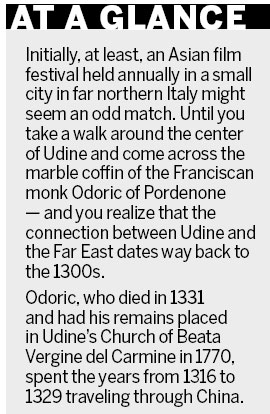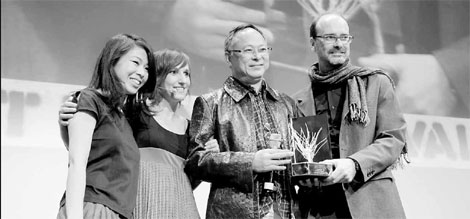Film festival bridges gap
Updated: 2012-05-13 07:50
By Mathew Scott(China Daily)
|
|||||||
|
Hong Kong filmmaker Johnnie To (second from right) receives the Golden Mulberry Career Achievement Award from the Far East Film Festival's senior manager Chui-Yee Cheung (left), festival president Sabrina Baracetti (second from left) and co-ordinator Thomas Bertacche. Provided to China Daily |
With the rise of Asia as a box-office force, the Far East Film Festival in Udine, northern Italy, acts as more than an event where the latest Asian films are introduced. Mathew Scott reports.
For 14 editions now the Far East Film Festival in Udine, northern Italy, has introduced the very latest in Asian commercial cinema to a European audience. Along the way, it has helped launch the international careers of noted directors such as Hong Kong's Johnnie To, South Korea's Park Chan-wook and the Chinese mainland's Zhang Yuan.
This year being the EU-China Year of Intercultural Dialogue makes the festival even more special. It wrapped up on April 28 and its circuit turns to Cannes from May 16.
"Bridging the gap" between cultures was very much the buzz phrase being passed around the nine-day festival in this picturesque castle city, which showcased 47 films representing the work of 54 directors from across Asia.
And, To was once again very much in the spotlight at a festival he has now visited six times, the first in 1998 when he was relatively unknown outside his native Hong Kong.
Back then, To brought All About Ah Long and The Longest Night to the festival, the first time his productions were screened to an international festival audience. This year, he was here with the romantic comedy Romancing in Thin Air, a film which stars Sammi Cheng and Louis Koo, as well as to celebrate his 57th birthday and to pick up the Golden Mulberry Career Achievement Award.
"This was the festival that first showed my films to the world, and I think it plays a very important part for Asian cinema," To said. "It does help bridge the gap and show the world what we can do. It gives us a chance to tell our stories to a whole new audience."
To also brought with him to Udine three young filmmakers - Mo Lai, Wong Wai-kit and Li Yin-fung - whose short films had the support of the Hong Kong Arts Development Council, under the Fresh Wave program the veteran director helps organize.
"I wanted them to know what it is like to show your films to a foreign audience who might not know what to expect," To said. "It was important for me to do that and it helps filmmakers when they see how different audiences react to their storytelling and their style."
Organizers reported more than 50,000 people attended the event, which saw the main Gelso d'Oro award handed to the gripping South Korean courtroom drama Silenced. The film focused on a controversial child abuse scandal in the country, a case that has been re-opened since the film's release last year. China's Du Jiayi took second place with the whimsical road trip One Mile Above.

"The result this year has been very good. We've had a large audience and [it] is an audience-oriented festival," said festival president Sabrina Baracetti, the driving force behind the Udine event. "Johnnie really wanted to come back this year not just alone but with the people he thinks are the future of Hong Kong cinema and this festival is really about the future."
Apart from Du, mainland Chinese cinema was represented by work from five other directors. They included Shang Jing, who screened the action-comedy My Own Swordsman, and Teng Huatao who brought the rom-com Love is Not Blind.
There was also a captivating photo exhibition from Zhang Yuan - winner of the Venice Film Festival's Grand Jury Award in 1999 for Seventeen Years - which looked at the characters that make up modern Beijing, from ordinary citizens to stars such as actress Shu Qi.
Also in keeping with the general theme of this year's festival was the concurrent Ties That Bind Asia-Europe Producers workshop - co-organized by October's Busan International Film Festival in South Korea - which turned attention to co-productions between filmmakers from the two regions.
It is a hot topic in the film world given the rise of Asia as a box-office force. The trend is sure to be further explored when the film festival circuit this week turns to Cannes and to Europe's largest annual cinematic gathering.
"The mix of different cultures and filmmaking backgrounds made for a very rich and I believe, fulfilling experience for the participants," says Udine workshop mentor Roger Garcia, who also fronts the Hong Kong International Film Festival.
Zhang Yuan, who also addressed the seminar, said filmmakers across Asia welcomed the interest the world was showing in their work and that this was especially the case for those coming from the Chinese mainland.
"Where Chinese cinema is going in the future is a question we all want to keep asking and opening dialogue like we have here is one of the ways we can do just that," he said.
Contact the writer at sundayed@chinadaily.com.cn.
(China Daily 05/13/2012 page15)
